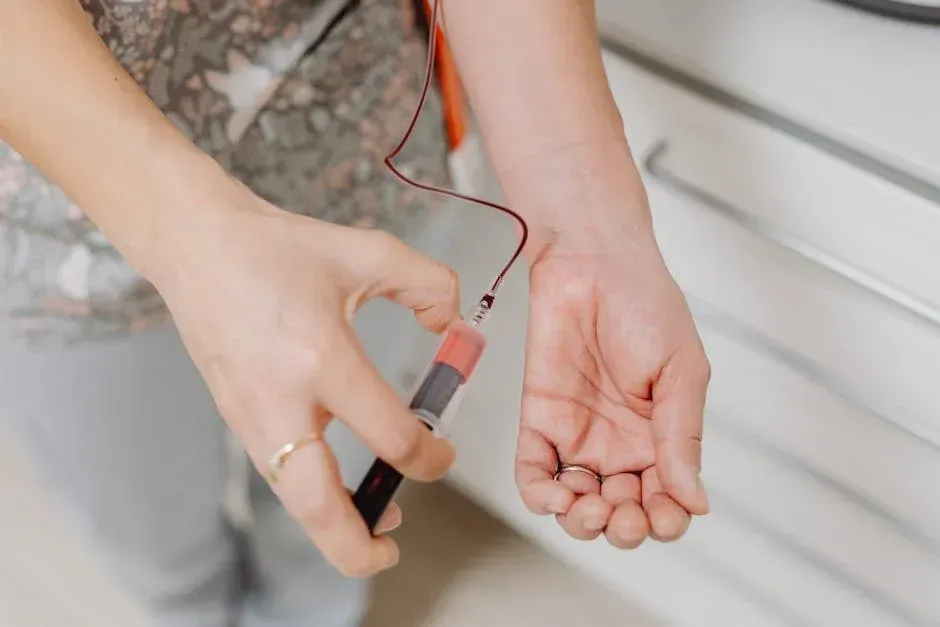The Peptide Revolution: How Therapy is Changing Health and Wellness
Peptide therapy is changing the health and wellness landscape by offering a targeted approach to optimize well-being. For those seeking a quick overview, here's what you need to know:
- Boosts Health: Improves muscle growth, improves skin health, and supports weight management.
- Supports Healing: Accelerates tissue repair and modulates immune responses.
- Improves Wellness: Aids cognitive function and reduces inflammation.
- Convenient Treatments: Available as injectable therapies, oral supplements, or skincare products.
Peptides are natural amino acid chains, smaller than proteins, that play crucial roles in various biological functions. From stimulating collagen production to influencing hormone release, these therapies are personalized for individual wellness goals.
I’m Travis Sugg, founder of Biomed Mobile IV & Wellness. With over a decade of experience in peptide therapy as a paramedic and IV therapy provider, I bring science-backed care directly to you. Let’s dive into how peptide therapy can lift your health!
Understanding Peptides
Peptides are fascinating molecules that are changing the way we approach health and wellness. To understand peptide therapy, let's first break down what peptides actually are.
Amino Acids and Proteins
Peptides are made up of amino acids, which are the building blocks of proteins. Think of amino acids as individual beads in a necklace. When you string a few beads together, you get a peptide. String a lot of beads together, and you have a protein.
- Amino Acids: These are organic compounds that combine to form proteins. Your body uses them to build muscle, repair tissues, and produce enzymes and hormones.
- Proteins: Larger molecules formed by long chains of amino acids. They play a vital role in body structure and function, including muscle development and immune response.
Peptides vs. Proteins
While both peptides and proteins are made of amino acids, peptides are smaller, typically containing 2 to 50 amino acids. This smaller size allows them to be more easily absorbed by the body, making them effective for various therapies.
Synthetic Peptides
In addition to natural peptides, we have
synthetic peptides. These are lab-made and designed to mimic the function of natural peptides. They can be custom for specific therapeutic purposes, like boosting growth hormone levels or enhancing skin elasticity.
- Synthetic Peptides in Therapy: These lab-created peptides are used to target specific areas of health and wellness. For example, CJC-1295 is known to stimulate growth hormone release, aiding in muscle growth and fat loss.
Peptides are incredibly versatile, with functions ranging from regulating hormones to enhancing immune responses. This versatility makes them an exciting area of focus for health optimization.
In the next section, we'll explore the benefits of peptide therapy, highlighting how these small molecules can have a big impact on your health.
Benefits of Peptide Therapy
Peptide therapy is revolutionizing health and wellness by offering a wide range of benefits. These benefits span from anti-aging to muscle growth, weight loss, cognitive function, and immune support.
Anti-Aging
One of the most exciting applications of peptide therapy is its potential to combat the signs of aging. Peptides like collagen-stimulating peptides improve skin elasticity and hydration, reducing wrinkles and promoting a youthful appearance. They work by encouraging collagen production, which is crucial for maintaining vibrant skin.
Muscle Growth
For those looking to build muscle, peptides can be a game-changer. Growth hormone-releasing peptides, such as CJC-1295 and Ipamorelin, promote lean muscle development. Unlike traditional steroids, they offer a safer alternative with fewer side effects, making them popular among athletes and fitness enthusiasts.
Weight Loss
Peptides also play a role in weight management. The peptide AOD-9604, for instance, is known for its targeted fat loss capabilities. By mimicking the natural processes of fat metabolism, it helps in reducing body fat while preserving muscle mass.
Cognitive Function
Improving cognitive function is another area where peptide therapy shows promise. Cognitive peptides, often referred to as nootropics, improve memory, focus, and mental clarity. They achieve this by influencing neurotransmitter systems and supporting brain health.
Immune Support
Peptides can also bolster the immune system. Some peptides stimulate T cell production, which is vital for the body's defense against pathogens. This makes peptide therapy a valuable tool for enhancing overall immune function.
In summary, peptide therapy offers a multifaceted approach to health optimization. Whether you're looking to turn back the clock on aging, build muscle, lose weight, improve brain function, or boost your immune system, peptides provide a custom solution to meet these goals.
In the next section, we'll dig into how peptide therapy works, shedding light on the mechanisms behind these impressive benefits.
How Peptide Therapy Works
Understanding how peptide therapy works requires a look at the body's internal processes. Peptides are like keys that open up specific doors in our body's complex systems. They play critical roles in hormone regulation, neurotransmitter activity, and immune system responses.
Hormone Regulation
Hormones are chemical messengers that control many bodily functions, from growth and metabolism to mood and immune response. Peptides can help regulate these hormones. For example, some peptides stimulate the release of growth hormone, which is essential for cell growth and repair. By influencing hormone levels, peptide therapy can help maintain balance in the body's systems, which is crucial for overall health.
Neurotransmitter Activity
Neurotransmitters are chemicals that transmit signals in the brain and throughout the body. They affect everything from mood and emotions to sleep and learning. Peptides can influence neurotransmitter activity, enhancing brain function and mood. For instance, certain peptides act as cognitive improvers, improving memory and focus by supporting healthy neurotransmitter function.
Immune System Responses
The immune system is the body's defense against illness and infection. Peptides can modulate immune responses, making them a powerful tool in maintaining health. Some peptides boost the production of T cells, the body's frontline defense against pathogens. This can help improve the body's ability to fight off infections and reduce inflammation, making peptide therapy beneficial for immune support.
Peptide therapy works by mimicking or enhancing the body's natural processes. This makes it a versatile and effective approach for health optimization. By targeting specific pathways, peptides offer a personalized way to address various health concerns, from hormonal imbalances to immune support.
Next, we'll explore some of the most popular peptides used in therapy and how they contribute to health and wellness.
Popular Peptides in Therapy
Peptide therapy is gaining popularity due to its targeted approach to health and wellness. Let's look at some of the most popular peptides used in therapy today.
CJC-1295
CJC-1295 is a growth hormone-releasing peptide. It stimulates the pituitary gland to increase growth hormone production. This peptide is often used to promote muscle growth, improve recovery, and support fat loss. By increasing growth hormone levels, CJC-1295 can also improve skin elasticity and energy levels. It's commonly combined with other peptides like Ipamorelin for improved effects.
Ipamorelin
Ipamorelin works by mimicking ghrelin, a hormone that stimulates growth hormone release. Unlike ghrelin, Ipamorelin doesn't increase hunger, making it a popular choice for muscle growth and fat loss without unwanted side effects. It helps in tissue repair and is often used in anti-aging therapies. When paired with CJC-1295, it offers a sustained release of growth hormone, maximizing benefits.
AOD-9604
Originally developed as an anti-obesity drug, AOD-9604 focuses on fat metabolism. It stimulates the breakdown of fats and prevents fat accumulation, making it effective for weight management. Unlike some weight-loss drugs, AOD-9604 doesn't affect appetite, allowing for fat reduction without changing eating habits.
GHK-Cu
GHK-Cu is known for its skin-rejuvenating properties. It promotes collagen production, which helps improve skin firmness and reduce wrinkles. GHK-Cu also has anti-inflammatory and antioxidant effects, making it beneficial for skin health and wound healing. This peptide is often used in skincare products and anti-aging treatments.
DSIP
DSIP, or Delta Sleep-Inducing Peptide, is used to improve sleep quality. It helps regulate sleep patterns and reduce stress. By promoting restful sleep, DSIP can improve overall well-being and cognitive function. It's particularly useful for those with sleep disturbances or stress-related issues.
These peptides offer targeted solutions for various health concerns, from muscle growth to skin health. By understanding the specific benefits of each peptide, individuals can choose therapies that best fit their health and wellness goals.
Next, we'll dig into how peptide therapy can address specific conditions like obesity, diabetes, and autoimmune disorders.
Peptide Therapy for Specific Conditions
Peptide therapy is not just a wellness trend; it's a promising approach to managing various health conditions. Let's explore how it can help with obesity, diabetes, autoimmune disorders, and chronic pain.
Obesity
Obesity is a growing concern worldwide, affecting millions of people. Peptides like AOD-9604 have shown promise in tackling this issue. This peptide targets fat metabolism by stimulating the breakdown of fats and preventing their accumulation. It doesn't influence appetite, making it a safe option for those looking to manage their weight without altering their diet.
Recent research highlights the role of AMPK-targeting peptides, such as Pa496h and Pa496m, in promoting mitochondrial fission. These peptides help break down large, inefficient mitochondria into smaller, more active ones, enhancing metabolism and aiding weight management. Source
Diabetes
Diabetes management can be challenging, but certain peptides offer hope. For example, the same AMPK-targeting peptides used for obesity also show potential in controlling blood sugar levels. By improving mitochondrial function, these peptides can improve glucose metabolism, which is crucial for individuals with diabetes. Peptide drugs like Semaglutide are already FDA-approved for type 2 diabetes, showing significant improvements in blood glucose control. Source
Autoimmune Disorders
Autoimmune disorders occur when the immune system mistakenly attacks the body's own tissues. Peptides like Thymosin Alpha 1 are used to modulate immune responses, helping to balance the immune system and reduce inflammation. This can be particularly beneficial for conditions like multiple sclerosis and rheumatoid arthritis, where immune dysregulation is a key issue.
Chronic Pain
Chronic pain can severely impact quality of life. Peptides such as BPC-157 have gained attention for their ability to accelerate tissue healing and reduce inflammation. BPC-157 promotes blood vessel growth and improves the body's natural healing processes, making it a valuable tool for managing pain from injuries or conditions like arthritis. Its neuroprotective properties also suggest potential benefits for nerve-related pain.
Peptide therapy offers a targeted approach to these specific conditions, providing new avenues for treatment and management. As research continues, the potential applications of peptides in healthcare are expanding, offering hope for those with chronic health challenges.
Next, we'll discuss the safety and side effects associated with peptide therapy.
Safety and Side Effects of Peptide Therapy
While peptide therapy is generally considered safe, it's important to be aware of possible side effects and risks. Consulting with a healthcare professional is crucial to ensure safe and effective treatment.
Allergic Reactions
Some individuals may experience allergic reactions to certain peptides. Symptoms can include hives, swelling, or difficulty breathing. It's essential to inform your doctor of any known allergies before starting therapy. If you experience any allergic symptoms, seek medical attention immediately.
Hormonal Imbalances
Peptides that affect hormone levels, such as growth hormone-releasing peptides, can lead to hormonal imbalances if not administered correctly. This can result in side effects like mood swings or changes in energy levels. Monitoring by a healthcare professional helps mitigate these risks by ensuring the correct dosage and administration.
Injection Site Reactions
Peptides are often administered via injection, which can sometimes cause pain, swelling, or bruising at the injection site. These reactions are usually mild and temporary. Using proper injection techniques and rotating injection sites can help minimize discomfort.
General Considerations
Peptide therapy is not a one-size-fits-all solution. Working with a qualified healthcare provider ensures that the treatment is custom to your needs and that any potential interactions with other medications are considered. Additionally, obtaining peptides from reputable sources is crucial to avoid unregulated or counterfeit products, which can pose significant health risks.
Always discuss your full medical history and any current medications with your healthcare provider before starting peptide therapy. This helps ensure the therapy is safe and effective for your specific health needs.
Next, we'll address some frequently asked questions about peptide therapy.
Frequently Asked Questions about Peptide Therapy
What does peptide therapy do for you?
Peptide therapy offers a range of benefits by leveraging small chains of amino acids to improve various bodily functions. These peptides can help improve hormone regulation, boost muscle growth, aid in weight loss, and support cognitive function. They can also strengthen the immune system and improve sleep quality. By targeting specific biological processes, peptide therapy can address issues like aging, muscle recovery, and even skin health. It's like giving your body's natural processes a helping hand.
What are the negative side effects of peptide therapy?
While many people find peptide therapy beneficial, it's not without potential side effects. The most common issues include:
- Allergic Reactions: Some individuals may experience hives, swelling, or difficulty breathing.
- Hormonal Imbalances: Peptides that influence hormones can lead to mood swings or energy changes if not properly managed.
- Injection Site Reactions: Pain, swelling, or bruising can occur where the peptide is injected.
It's crucial to consult with a healthcare provider to monitor these risks and adjust treatment as needed. Ensuring proper administration and dosage can help minimize these side effects.
How much does peptide therapy cost?
The cost of peptide therapy can vary widely based on the type of peptides used, the treatment duration, and the provider's pricing structure. Some peptides are more expensive than others, and additional costs may include consultation fees and follow-up appointments. It's best to discuss pricing with your healthcare provider to understand the full financial commitment. That investing in a reputable and experienced provider is essential for both safety and effectiveness.
For more detailed information or to schedule a consultation, consider reaching out to Biomed Mobile IV & Wellness to explore how peptide therapy might benefit you.
Conclusion
At Biomed Mobile IV & Wellness, we're redefining health and wellness with personalized solutions custom to your unique needs. Our mobile services bring peptide therapy and IV treatments directly to you, whether you're at home, work, or a special event. This convenience ensures that you receive the care you need without disrupting your schedule.
Our team serves a wide range of Colorado locations, including Denver, Boulder, and Fort Collins. We focus on delivering expert-led care with a personalized touch, ensuring that every treatment aligns with your health goals. From busy professionals seeking a quick energy boost to athletes needing rapid recovery support, our services cater to diverse needs.
Peptide therapy is one of our premium offerings, providing advanced benefits such as weight loss support, improved energy, and improved immune function. By leveraging cutting-edge peptides like CJC-1295 and Ipamorelin, we help you achieve optimal wellness.
For those interested in exploring how peptide therapy can improve their health journey, we invite you to learn more about our weight loss therapy options.
At Biomed Mobile IV & Wellness, we are committed to helping you achieve your health goals with safe, effective, and convenient solutions. Experience the benefits of personalized wellness care, right at your doorstep.



